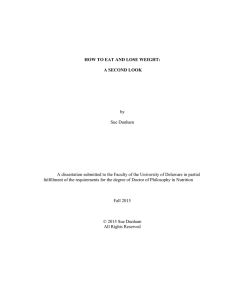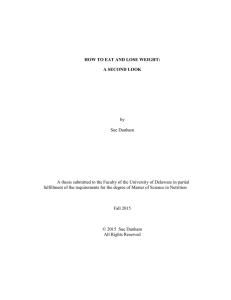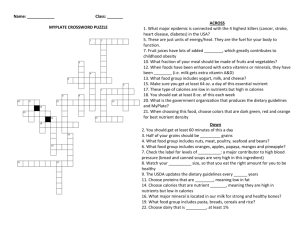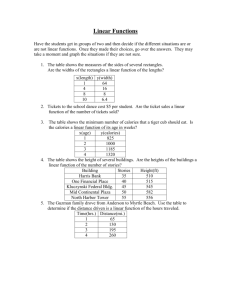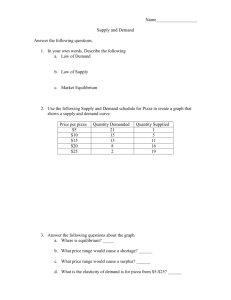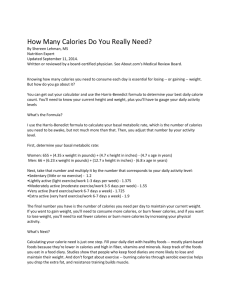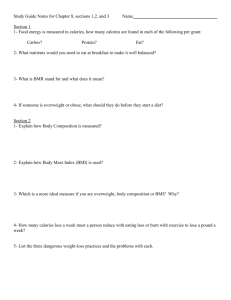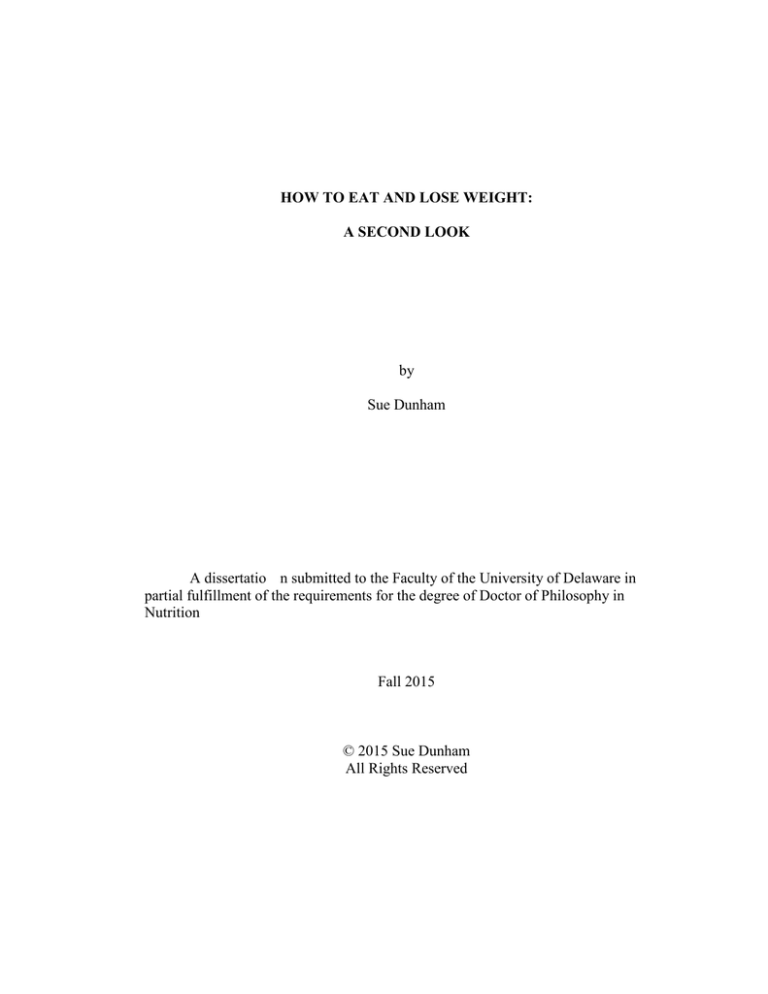
HOW TO EAT AND LOSE WEIGHT:
A SECOND LOOK
by
Sue Dunham
A dissertatio n submitted to the Faculty of the University of Delaware in
partial fulfillment of the requirements for the degree of Doctor of Philosophy in
Nutrition
Fall 2015
© 2015 Sue Dunham
All Rights Reserved
HOW TO EAT AND LOSE WEIGHT:
A SECOND LOOK
by
Sue Dunham
Approved:
__________________________________________________________
Fats Domino, Ph.D.
Chair of the Department of Nutrition
Approved:
__________________________________________________________
Minnesota Fats, Ph.D.
Dean of the College of Hard Knockwurst
Approved:
__________________________________________________________
Ann L. Ardis, Ph.D.
Senior Vice Provost for Graduate and Professional Education
I certify that I have read this dissertation and that in my opinion it meets
the academic and professional standard required by the University as a
dissertation for the degree of Doctor of Philosophy.
Signed:
__________________________________________________________
Fats Waller, Ph.D.
Professor in charge of dissertation
I certify that I have read this dissertation and that in my opinion it meets
the academic and professional standard required by the University as a
dissertation for the degree of Doctor of Philosophy.
Signed:
__________________________________________________________
Fat Albert, Ph.D.
Member of dissertation committee
I certify that I have read this dissertation and that in my opinion it meets
the academic and professional standard required by the University as a
dissertation for the degree of Doctor of Philosophy.
Signed:
__________________________________________________________
Virginia Slims, Ph.D.
Member of dissertation committee
I certify that I have read this dissertation and that in my opinion it meets
the academic and professional standard required by the University as a
dissertation for the degree of Doctor of Philosophy.
Signed:
__________________________________________________________
Slim Pickens, M.K.C.
Member of dissertation committee
ACKNOWLEDGMENTS
I wish to thank all of the little people (especially Chicken Little); my adviser,
Fats Waller; and my friends and colleagues Fat Albert, Virginia Slims, and Slim
Pickens. I must also thank my spouse, Andy Nim, without whom none of this would
ever have been possible.
iv
TABLE OF CONTENTS
LIST OF TABLES ........................................................................................................ vi
LIST OF FIGURES ...................................................................................................... vii
ABSTRACT ................................................................................................................ viii
Chapter
1
A NEW SOLUTION TO AN OLD PROBLEM ................................................ 1
1.1
Various Methods ....................................................................................... 1
1.1.1
Proposal ......................................................................................... 2
1.1.1.1
Heating and Thawing ..................................................... 2
1.1.1.1.1
2
The Steak Example ....................................... 3
THE NEED TO EAT AND OVERINDULGE .................................................. 4
2.1
2.2
Processes.................................................................................................... 4
Materials .................................................................................................... 4
REFERENCES ............................................................................................................... 6
Appendix
A
B
CALORIES OF COMMON FOODS ................................................................. 7
TRADITIONAL RECIPES FROM MY MOTHER’S AND
GRANDMOTHER’S KITCHENS ..................................................................... 8
B.1 Homemade Hamburgers ............................................................................ 8
v
LIST OF TABLES
Table 1.1:
Heating and Thawing. The caloric energy needed for heating and
thawing frozen milk................................................................................... 2
Table 2.1:
Frozen Pizza Brands Review. Are they worth the calories? ..................... 5
vi
LIST OF FIGURES
Figure 1.1: The Steak Example (T-bone cut)............................................................... 3
vii
ABSTRACT
The problem of energy equilibrium in the human body has received a great
deal of attention in the United States. Many methods have been advocated to reduce
the caloric value of the food without affecting its taste or the appetite of the consumer.
Some pharmaceutical houses have even expanded by wise investment of the monetary
equivalent of the weight theoretically lost by their customers.
viii
Chapter 1
A NEW SOLUTION TO AN OLD PROBLEM
The problem of energy equilibrium in the human body has received a great
deal of attention in the United States.1 Many methods have been advocated to reduce
the caloric value of the food without affecting its taste or the appetite of the consumer.
Some pharmaceutical houses have even expanded by wise investment of the monetary
equivalent of the weight theoretically lost by their customers.2
1.1
Various Methods
The various methods advocated involve either a drastic reduction in the
quantity of the food ingested, use of drugs that affect the appetite, or increase in the
amount of physical exercise. The first method leaves the patient permanently hungry,
the second makes him subhuman by dulling his senses, and the third defeats its own
purpose by increasing the appetite and leading to a vicious cycle.
As seen by the public’s increased awareness with health and physical fitness over the
last decade.
1
This article is adapted from the Journal of Irreproducible Results. Copyright 1983
by the Journal of Irreproducible Results. Reprinted by permission, Workman
Publishing. All Rights Reserved.
2
1
1.1.1
Proposal
In this communication, I propose a new method of reducing, without changing
the quantity of the food ingested. The method is based on the principle that the caloric
value of the food also depends on its temperature.
For each degree of temperature of the food below the temperature of
the human body, the body has to supply heat (energy) to raise the
temperature of the food to that of the body.
The next section will discuss changing temperatures and the effect they have on the
breakdown of the molecular structure of food.
1.1.1.1
Heating and Thawing
When food is frozen, heat of thawing has to be supplied to it at the rate of
80 calories/gram of water contained in the food in addition to 1 calorie/gram for each
degree centigrade of the temperature rises. Table 1 shows this using the example of
frozen milk.
Table 1.1:
Heating and Thawing. The caloric energy needed for heating and thawing
frozen milk.
Substance
0 Degrees C
37 Degrees C
Frozen Milk
16,000 cal.
27,400 cal.
One can easily see that a glass of frozen milk (200 grams) at the temperature of
deep freeze, i.e., -20 degrees C, would need 200 × 80 calories for thawing and 200 ×
57 calories for heating up to 37 degrees C (98 degrees F), i.e., 16,000 + 11,400 =
27,400 calories or 27.4 Cal. The caloric value of a glass of whole milk is 138 Cal. and
of skim milk, only 74 Cal. Thus,
2
(27.4 × 100)
= 34%
74
(1.1)
of caloric milk energy is lost for its heating. If you dilute the milk in the ratio of 1:2,
68% of the energy would be lost on consuming the same amount (200 grams) of milk.
1.1.1.1.1 The Steak Example
Similarly, one can calculate that consumption of a pre-cooked frozen steak
calls for an expenditure of at least one third of its caloric value on the thawing and
Figure 1.1: The Steak Example (T-bone cut).
heating. See figure 1.1 for an image of the steak. If one adds to this the amount of
energy supplied as heat by the body and the mechanical energy required to crush the
food with the jaws, the loss of the caloric value of the food becomes even greater.
For those individuals who do not care to crush their food with their teeth, there
are several alternatives …
3
Chapter 2
THE NEED TO EAT AND OVERINDULGE
2.1
Processes
As we all know, it takes 1 calorie to heat 1 gram of water 1 degree centigrade.
Translated into meaningful terms, this means that if you eat a very cold dessert
(generally consisting of water in large part), the natural processes which raise the
consumed dessert to body temperature during the digestive cycle literally suck the
calories out of the only available source, your body fat.
2.2
Materials
Referring back to equation 1.1, a dessert served and eaten at near 0 degrees C
(32.2 degrees F) will, in a short time, be raised to the normal body temperature of
37 degrees C (98.6 degrees F). For each gram of dessert eaten, that process takes
approximately 37 calories as stated above. The average dessert portion is 6 oz, or
168 grams. Therefore, by operation of thermodynamic law, 6,216 calories
(1 cal./g/deg. × 37 deg. × 168 g) are extracted from body fat as the dessert's
temperature is normalized. Allowing for the 1,200 latent calories in the dessert, the net
calorie loss is approximately 5,000 calories.
Obviously, the more cold dessert you eat, the better off you are, and the faster
you will lose weight if that is your goal. This process works equally well when you are
drinking very cold beer in frosted glasses. The results here are really remarkable, and
it beats running, hands down. Unfortunately, for those who eat pizza as an excuse to
4
drink beer, pizza (loaded with latent calories and served above body temperature)
induces an opposite effect. But, thankfully, as the astute reader should have already
reasoned, the obvious solution is to drink a lot of beer with pizza and follow up
immediately with large bowls of ice cream.
Table 2.1:
Frozen Pizza Brands Review. Are they worth the calories?
Brand/Type
365 Mediterranean Pizza
Vegetable
American Flatbread Pizza
Sundried Tomato and
Mushroom
Amy's Pizza
Spinach
DiGiornoCrispy Flatbread
Pizza Mushroom Medley
Cost
Calories per Serving
Fat
$5.00
300
12g
$12.00
340
12g
$7.00
310
12g
$6.89
320
19g
A way to significantly improve the results would be to cook the pizza, then put
it in the refrigerator overnight and eat it (cold) the next morning. Since the pizza
would be below body temperature, it would provide even greater calorie loss to the
body!
We could all be thin if we were to adhere religiously to a pizza, beer, and ice
cream diet…
5
REFERENCES
Haveman, Edith W. "The Awesome and Ridiculous Phony Crash Dieting Craze." Life
PHAT, December 6, 1959.
Sherman, Howard, and Donald D. Kelley. Essentials of Nutrition and Diet. New York:
Macmillan, 1945.
.
6
Appendix A
CALORIES OF COMMON FOODS
A handy list of common foods and their nutritional information helps to
maintain your weight. See table 2.1 for an example of frozen pizzas.
7
Appendix B
TRADITIONAL RECIPES FROM MY MOTHER’S AND
GRANDMOTHER’S KITCHENS
B.1 Homemade Hamburgers
This makes 4 burgers. Just increase the ingredients as needed for more.
Equipment:
•
A bowl
•
A sharp knife
•
A cutting board
•
A skillet or heavy frying pan (or a grill)
Ingredients:
•
1lb/500g ground sirloin
•
1 half onion grated or finely chopped; one can substitute green onions,
but use the bulb only.
•
4 pinches ground coriander; one can use cumin instead for more spice.
•
4 pinches paprika powder; optional smoked, spicy or sweet paprika for
a savory variety.
•
A dash of fresh ground black pepper
•
A pinch of salt
•
A tablespoon of Worcestershire sauce
•
1 egg lightly beaten
8
First, mix all the ingredients in a bowl and, using your hands, shape into four
balls. Turn the heat to medium under the skillet and add a tiny amount of oil. When
the skillet is hot, add the burgers, pushing them flat with a spatula. Cook for about
3 minutes on each side for medium rare, longer for well done and less for rare.
Just before the burgers are ready, toast the inside of the buns under a broiler,
over a grill, or in a toaster. If using a grill or broiler, spread a little butter on the buns
first. My personal preference for serving them is to spread a little mayonnaise on the
bottom of the bun then add the burger, a thin slice of raw onion, a lettuce leaf, and a
slice of tomato. I top it off with a dab of ketchup and a good helping of English
mustard on the top half of the bread. But the great thing about making homemade
hamburgers is that you can add what you want. I like to serve them with homemade
French fries.
9

